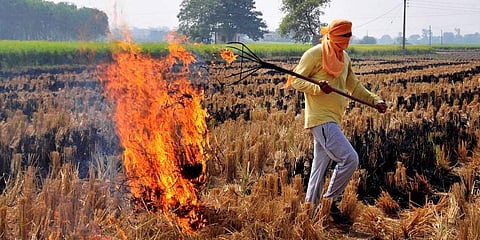

NEW DELHI: The Delhi government on Tuesday started free spraying of Pusa bio-decomposer in agricultural fields to prevent stubble burning in the capital.
Prepared by scientists at the Indian Agricultural Research Institute (IARI) here, the Pusa bio-decomposer is a microbial solution which can turn paddy straw into manure in 15-20 days.
Environment Minister Gopal Rai, who sprayed the bio-decomposer in a field in Burari, said the spraying of the solution got delayed due to rains earlier this month.
The solution will be sprayed on 5,000 acres of basmati and non-basmati fields in the capital this year.
The Pusa bio-decomposer was used on 4,300 acres of land belonging to 844 farmers in Delhi last year.
In 2020, 310 farmers had used it on 1,935 acres of land.
The Delhi government has set up 21 teams to create awareness about the effectiveness of bio-decomposer and register farmers who want to use the solution in their fields.
According to officials, spraying of bio-decomposer costs just Rs 30 per acre.
In 2021, a third-party audit conducted to ascertain the impact of the microbial solution in Delhi showed that it was 95 percent effective, following which Kejriwal had requested the Centre to distribute it free in neighbouring states.
Along with unfavourable meteorological conditions, paddy straw burning in Punjab and Haryana is a major reason behind the alarming spike in air pollution levels in the national capital in October and November.
Farmers set their fields on fire to quickly clear off the crop residue before cultivating wheat and vegetables.
According to the IARI data, Punjab had reported 71,304 farm fires between September 15 and November 30 last year and 83,002 farm fires in the corresponding period in 2020.
Last year, the share of farm fires in Delhi's PM 2.5 pollution had peaked to 48 per cent on November 7.